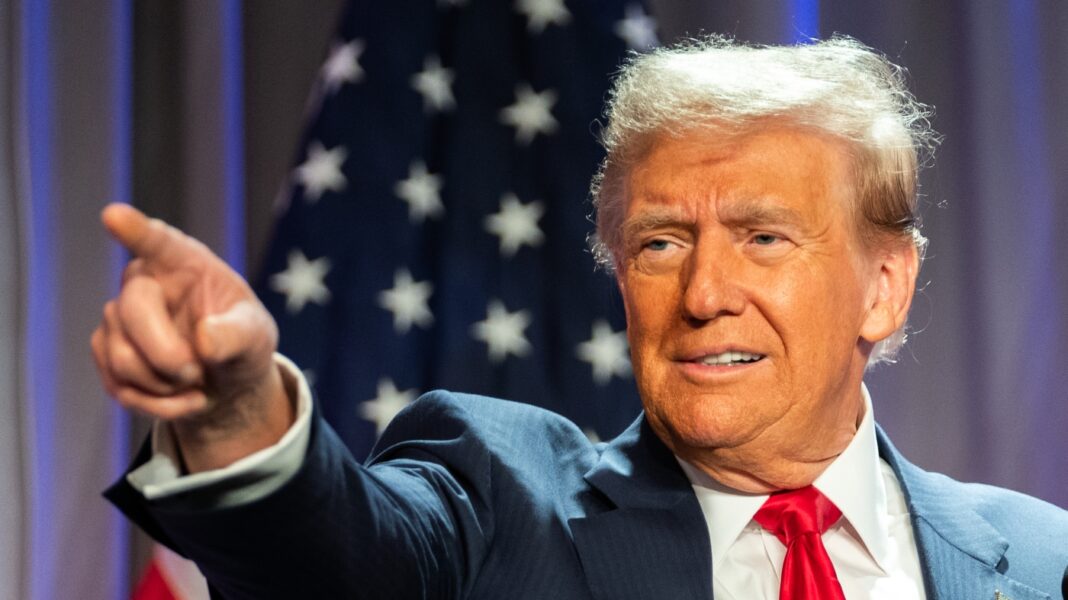
President-elect Donald Trump, seen here on Nov. 13, has promised a range of tax cuts. But those cuts come with a price.
Allison Robbert/Getty Images
hide caption
toggle caption
Allison Robbert/Getty Images
On the campaign trail, Donald Trump promised to put more money back in Americans’ pockets by cutting their taxes.
“My plan will massively cut taxes for workers and small businesses, and we will have no tax on tips, no tax on overtime and no tax on Social Security benefits,” Trump pledged at a rally in Raleigh, N.C., the day before the election.
What will a second Trump presidency mean for your taxes? It could add up to a lower tax bill, but it might also have drastic consequences for the national budget.
Trump is likely to renew his big 2017 tax cuts
In 2017, Trump pushed through a major tax overhaul called the Tax Cuts and Jobs Act. Most of the individual tax and estate tax provisions will expire at the end of next year, and Trump and the Republican-controlled Congress are widely seen as likely to extend them. (There was also a big cut to the corporate tax rate, but that does not expire.)
When it comes to your taxes, extending the 2017 law means preserving the status quo. You probably saved some money on your taxes due to the 2017 law, and that will continue if the law’s provisions remain.
For a household making $60,000 to $100,000 a year, these tax cuts mean keeping about $1,000 that would otherwise be due if these cuts expired, says Joseph Rosenberg, a senior fellow at the Urban-Brookings Tax Policy Center.
For those households making more than a million dollars, it means reducing their taxes by about $70,000 on average.
But these cuts are costly. Estimates have found that extending the 2017 law would increase the national debt by more than $4 trillion over the next 10 years. And so far, it’s unclear how Trump and Republicans plan to pay for the extension of the tax cuts.

Trump congratulates then-House Speaker Paul Ryan, R-Wis., during an event to celebrate Congress passing the Tax Cuts and Jobs Act with Sen. Mitch McConnell in 2017.
Chip Somodevilla/Getty Images/Getty Images North America
hide caption
toggle caption
Chip Somodevilla/Getty Images/Getty Images North America
“No tax on tips” sounds simple — but it could be messy
Trump’s campaign promise of “no tax on tips” made big headlines, but this provision would affect just a small part of the labor market — only about 2.5% of all employment, according to the Budget Lab at Yale University. And more than a third of tipped workers earn so little that they already don’t pay federal income tax.
Details are scant on exactly how this proposal would work. One question is whether this exemption is only for income taxes or whether it would also apply to payroll taxes.
But eliminating tax on tips could probably lead to some squirrelly effects. For example, say a tree trimmer usually charges $500 for his services. Now, he might say it costs $300 to trim the tree but that he expects a $200 tip — knowing he won’t be taxed on it. Tipping might proliferate into services where it hasn’t been common before.
Employers might also attempt to reclassify employees as tipped workers and drop their pay to the tipped minimum wage — for which the federal minimum is now $2.13 an hour.
Exempting tips from being taxed would blow another hole in the federal budget: It would add about $100 billion over 10 years.
Ending taxes on Social Security benefits would hurt Social Security
Among the tax cuts Trump promised is to exempt Social Security benefits from being taxed.
For most current retirees, this proposal would have no effect on their taxes.
That’s because only about 40% of people who get Social Security pay federal income taxes on it. (Paying this tax “usually happens if you have other substantial income in addition to your benefits,” according to the Social Security Administration.)
But the effects of this change would be huge — and it would make things worse for those who are still years away from drawing Social Security. A big chunk of the taxes on Social Security go straight into funding the Social Security Trust Fund. So eliminating these taxes means reducing the money for Social Security.
Social Security is already at risk. If no one pays taxes on Social Security benefits, that fund will run out sooner than it’s already on track to do.






